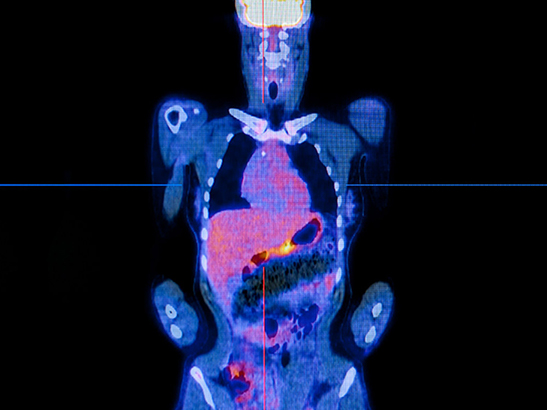
A PET scan
An advanced type of scan merging two imaging technologies could tell doctors whether treatment for head and neck cancer is working after just one cycle of chemotherapy.
A team at The Institute of Cancer Research, London, and The Royal Marsden NHS Foundation Trust used a scan combining PET and CT to measure a tumour’s energy use and the conversion of glucose into energy.
The study suggested that if, after the first round of chemotherapy, a tumour’s energy use score fell by more than 55% or glucose score by more than 60%, the patient was likely to respond well to treatment.
The ability to identify patients responding well to chemotherapy early is important as it gives clinicians time to consider reducing treatment to spare some of the side-effects.
Patients with an unfavorable response may require an increase in radiotherapy or other treatments.
The researchers found that, unlike PET/CT, MRI scans were less well able to predict which patients were responding well to treatment.
Imaging techniques compared
Their study, published in The Journal of Nuclear Medicine, is the first in head and neck squamous cell carcinoma to compare PET/CT and MRI scans following each cycle of chemotherapy.
Researchers examined 20 patients as part of the INSIGHT trial based at The Royal Marsden and supported by Cancer Research UK.
They assessed patients three months after completion of a combination of chemotherapy and radiotherapy, and determined them to be either responders or non-responders.
Study leader Professor Kevin Harrington, Joint Head of the Division of Radiotherapy and Imaging at the ICR and a Consultant at The Royal Marsden, said: “Head and neck cancers are some of the most difficult to treat, so it’s vital that we find ways to tell whether the therapy we are giving our patients is working quickly.
“Our work suggests that high-tech PET/CT scans can spot patients whose treatment might not work very rapidly, after only one cycle of chemotherapy. That gives patients and clinicians either the confidence to persist with treatment, or early warning that it isn’t working so that it can be urgently switched for an alternative approach.”
